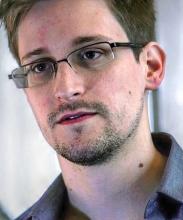What Is It
You might think we each have a moral duty to expose any serious misconduct, dishonesty, or illegal activity we discover in an organization, especially when such conduct directly threatens the public interest. However, increasingly we are seeing whistleblowers punished more harshly than the alleged wrongdoers, who often seem to get off scot-free. Given the possibility of harsh retaliation, how should we understand our moral duty to tell the truth and reveal wrongdoing? Should we think of whistleblowers as selfless martyrs, as traitors, or as something else? Do we need to change the laws to provide greater protection for whistleblowers? John and Ken welcome our era's most renowned whistleblower, former CIA analyst Edward Snowden, for a program recorded as part of the Stanford Symbolic Systems Program Distinguished Speaker series.
Listening Notes
The show kicks off with John championing the value of whistleblowing for holding the government and powerful corporations accountable. Ken begins to agree but warns that individuals acting without supervision may debilitate these institutions from functioning properly. The conversation pivots to a discussion about government surveillance, the Patriot Act, and respect for the law—John and Ken taking opposite sides of the debate.
As the discussion circles back to the moral character of whistleblowers, the Roving Philosophical Report is filed, and Edward Snowden joins the conversation. John asks Snowden how he views himself after blowing the whistle on the NSA. Snowden dismisses the idea that he even thinks about himself. After Snowden re-affirms his commitment to justice, Ken presses him on how he moved from an insider in the CIA and NSA to a staunch opponent of them. Snowden describes how his faith in the government’s operations eroded over time.
After a short break, Ken makes the distinction between whistleblowing being a matter of duty or choice. Snowden describes the specific nature of the oath he had to take to join the CIA and where his allegiances were aligned. Snowden goes on to distinguish between morality and legality, and how he saw those come apart. Snowden then goes over an example of when the NSA misled Congress and the American people about the breadth of government surveillance. He offers another example explaining how federal courts were also kept out of the loop. Snowden cites a lack of self-correction in systems as justification for whistleblowing.
John and Ken invite members from the audience to ask Snowden questions. Should intent be taken into account for morally or legally evaluating a whistleblower? Was Snowden’s whistleblowing attempting to dismantle the relevant government surveillance programs? Why did Snowden go to the press first instead of publishing the documents off-hand? Snowden’s actions were compared to those of Julian Assange. After a short break, questions continue. Responding to one question, Snowden explains the potential implications of his whistleblowing on actual policy changes. Ken then challenges him that his idealized conception of political liberties is outdated. Snowden, with John concludes on a less hopeful note, contemplating the difficulties of regulating and overseeing our government.
- Roving Philosophical Report (Seek to 6:50): Shuka Kalantari describes the story of Yasir Afifi, who had been tracked and closely surveyed by the FBI without a warrant, and the proceeding lawsuit Afifi filed against the FBI.




Comments (6)
danieldevon2
Saturday, August 3, 2024 -- 3:22 PM
The truth should always beThe truth should always be exposed. Regardless.
custom cabinets in sarasota
danieldevon2
Saturday, December 7, 2024 -- 1:34 AM
I had to come back and secondI had to come back and second what I said before. It's really important. Dothan Tree Service
danieldevon2
Saturday, August 3, 2024 -- 3:24 PM
If it isn't then don't. I donIf it isn't then don't. I don't understand this world sometimes.
cabinet makers in sarasota
cabinet refinishing sarasota
fort collins custom cabinetry
danieldevon2
Sunday, December 15, 2024 -- 7:55 AM
Yep, love philosophy and thisYep, love philosophy and this is a great take on the subject. I'm not sure exactly how I fell about it, personally. Concrete Contractors Kennewick, WA
JanetAWilliams
Monday, February 3, 2025 -- 1:18 PM
Such series are informative,Such series are informative, and we can learn new ideas to implement. These ideas you shared here are good to think about and at the North Brisbane quality stump grinders we can see how to resolve the issues that people are facing so they can resolve it easily by using these services.
limcyrussss
Tuesday, April 15, 2025 -- 2:52 AM
A powerful and thoughtA powerful and thought-provoking discussion. Snowden’s story forces us to rethink the balance between national security, individual conscience, and the public’s right to know.
https://www.customconcreteholland.com/services/holland-commercial-concrete-contractors